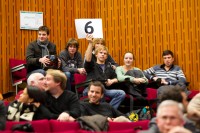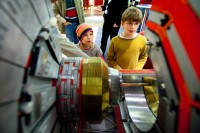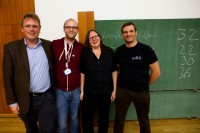
The audience is the jury at every science slam, including last week's at DESY in Hamburg. Image: DESY
If you ever take part in a science slam and really, really want to come first, here’s a tip: play music on stage. It worked when Brian Foster played the violin to slam about hidden dimensions back in March and it worked when LHC physicist Klaus Desch from Bonn University in Germany used a piano to explain particle acceleration at a physics slam last week. Exhibitions, lectures, masterclasses, competitions and of course and science slams in 15 places all over Germany celebrated the second anniversary of collisions in the Large Hadron Collider (LHC) on 23 November, the day officially declared “Weltmaschine day” (the Germans like to refer to the LHC as the world machine).
At DESY in Hamburg, four scientists competed for the title of best slammer, but none of them was bold enough to get out their recorder and play a physics tune. So what was the recipe for success there? The ILC, it seems: Marc Wenskat’s show on “cool accelerators or the connection between car crashes and particle physics” had the audience shouting for an encore. Instead of live music, he used a video of a playground experiment gone wrong to explain the principle of a ring accelerator and a picture of a car crash (where an airplane is created that then decays into several VW beetles and a couple of Smart cars) to illustrate the work of a particle physicist analysing a collision.

"Weltmaschine" day celebrated the second anniversary of collisions in the LHC with exhibitions, masterclasses, lectures and slams. Image: DESY
ILC scientist Ingrid Gregor had the audience dreaming of sandy beaches before she made the link to silicon detectors, ILC machine detector interface specialist Karsten Buesser played traffic warden for speeding neutrinos and Karsten Gadow explained the wonders of pet scanning, stopping short of a live endoscopy. Earlier in the day, theorist Gudrid Moortgat-Pick had philosophised about precision in physics in DESY’s popular science café.
All evening events across Germany kicked off with a video feed from CERN where Director General Rolf Heuer presented the latest results from the LHC and wished all locations a fun evening. During the day, students had taken part in particle physics masterclasses organised by the educational network Netzwerk Teilchenwelt, which also named the winner of its video competition “(IN)VISIBLE” – watch the student videos here.
Full lecture halls and the numbers of visitors in the exhibitions in Bonn and Munich showed that particle physics is a popular topic at the moment. With the Higgs lurking around the corner, it is likely to stay that way for a while. “This is the end of my talk,” concluded Wenskat on his last-but-one slide, “but it’s the beginning of a new era!”


Recent Comments